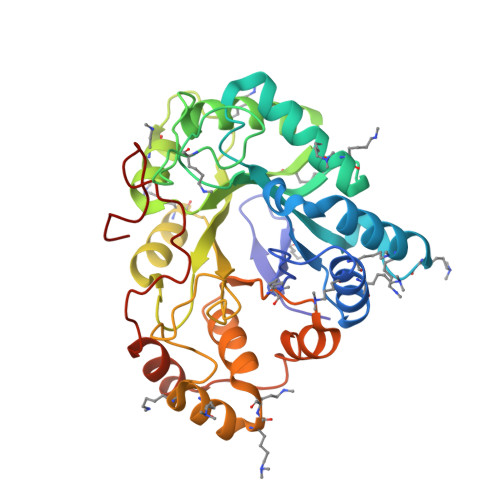Structural Determinants of the Selectivity of 3-Benzyluracil-1-acetic Acids toward Human Enzymes Aldose Reductase and AKR1B10.
Ruiz, F.X., Cousido-Siah, A., Porte, S., Dominguez, M., Crespo, I., Rechlin, C., Mitschler, A., de Lera, A.R., Martin, M.J., de la Fuente, J.A., Klebe, G., Pares, X., Farres, J., Podjarny, A.(2015) ChemMedChem 10: 1989-2003
- PubMed: 26549844
- DOI: https://doi.org/10.1002/cmdc.201500393
- Primary Citation of Related Structures:
4XZH, 4XZI, 4XZL, 4XZM, 4XZN - PubMed Abstract:
The human enzymes aldose reductase (AR) and AKR1B10 have been thoroughly explored in terms of their roles in diabetes, inflammatory disorders, and cancer. In this study we identified two new lead compounds, 2-(3-(4-chloro-3-nitrobenzyl)-2,4-dioxo-3,4-dihydropyrimidin-1(2H)-yl)acetic acid (JF0048, 3) and 2-(2,4-dioxo-3-(2,3,4,5-tetrabromo-6-methoxybenzyl)-3,4-dihydropyrimidin-1(2H)-yl)acetic acid (JF0049, 4), which selectively target these enzymes. Although 3 and 4 share the 3-benzyluracil-1-acetic acid scaffold, they have different substituents in their aryl moieties. Inhibition studies along with thermodynamic and structural characterizations of both enzymes revealed that the chloronitrobenzyl moiety of compound 3 can open the AR specificity pocket but not that of the AKR1B10 cognate. In contrast, the larger atoms at the ortho and/or meta positions of compound 4 prevent the AR specificity pocket from opening due to steric hindrance and provide a tighter fit to the AKR1B10 inhibitor binding pocket, probably enhanced by the displacement of a disordered water molecule trapped in a hydrophobic subpocket, creating an enthalpic signature. Furthermore, this selectivity also occurs in the cell, which enables the development of a more efficient drug design strategy: compound 3 prevents sorbitol accumulation in human retinal ARPE-19 cells, whereas 4 stops proliferation in human lung cancer NCI-H460 cells.
Organizational Affiliation:
Department of Integrative Biology, Institut de Génétique et de Biologie Moléculaire et Cellulaire, CNRS, INSERM, UdS, rue Laurent Fries, 67404, Illkirch CEDEX, France. fxavier.ruiz@gmail.com.


















